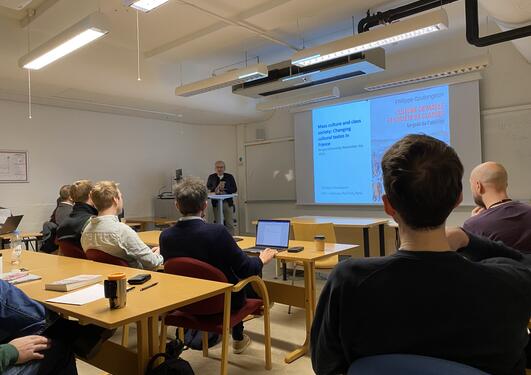Network for culture, inequality and democracy (KUD/CID) researches connections between the culture and media field (understood as audience, use, texts, institutions and politics) and social inequality, with a particular focus on implications for democracy, participation and citizenship. The network is led by Jan Fredrik Hovden and Torgeir Uberg Nærland.
NEWEST PUBLICATIONS
Nærland, T. (2023). “Towards a sociologically enriched understanding of anti-media populism: The case of Enough is Enough!”. International journal of communication.
Hovden, J. F. (2023). “The same everywhere? Exploring structural homologies of national social fields using the case of journalism”. The British Journal of Sociology, 1468-4446.13023.
Hovden, J. F. (2023). “Worlds apart. On class structuration of citizens’ political and public attention and engagement in an egalitarian society”. European Journal of Cultural and Political Sociology, 10(2), 209–232.
Driessen, O and Nærland, T.U. (2022). “Mediated recognition: Identity, respect, and social justice in a changing media environment”. (Editors introduction) in Communications, de Greuter
Dahl, J. M. and Nærland, T. U (2022) "Playful recognition: Television comedy and the politics of mediated recognition", Communications, de Greuter.
Nærland, T.U & Dahl, J.M. (2022). “Beyond representation: Public service media, minorities and the promotion of capabilities through entertainment”. Poetics. ElsevierFlemmen, M., Hjellbrekke, J.,
Hovden, J. F. and Jarness, V. (2022). “Stability, Transformation, and Escalation: Norwegian Classes and Class Boundaries 2008–2020”. Class Boundaries in Europe. The Bourdieusian Approach in Perspective. London: Routledge.
Hovden, J. F and Rosenlund, L. (2021). “Class and Everyday Media Use. A Case study from Norway”. Nordicom Review.
Hovden, J. F (2021). “Dårlige borgere? Arbeiderklassen i den moderne offentligheten”. I Ljunggren og Nordli Hansen Arbeiderklassen. Oslo: Cappelen Damm.
Nærland, T.U., Hovden, J.F., Moe, H. (2020). “Enabling Cultural Policies? Culture, Capabilities and Citizenship”. International Journal of Communication
Open Positions Network for culture, inequality and democarcy
- Postdoctoral Research Fellow position within acoustics and distributed fibre optic sensing
- Postdoctor position at the Centre for Climate and Energy Transformation (CET)
- PhD candidate at the Centre for Climate and Energy Transformation (CET)
- PhD Research Fellow in Marine Biogeochemistry
- Researcher in Ice Dynamics and Climate Modelling




